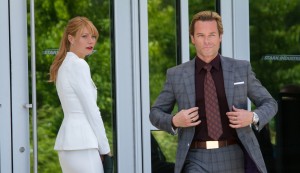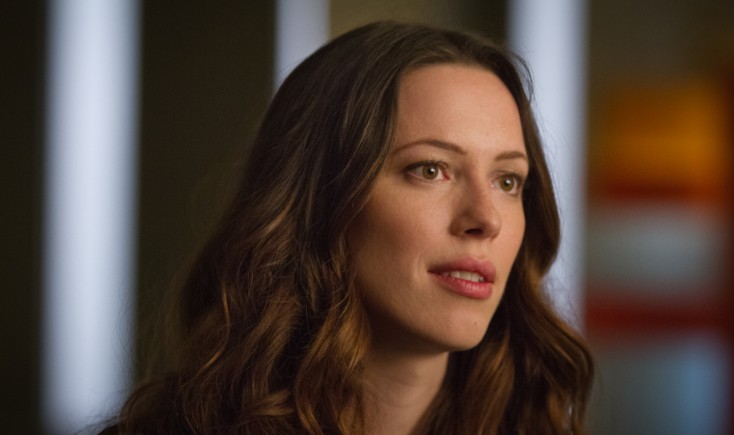
(l-r) Pepper Potts (Gwyneth Paltrow) & Aldrich Killian (Guy Pearce) in “Marvel’s Iron Man 3.” © 2012 MVLFFLLC. TM & © 2012 Marvel. CR: Zade Rosenthal.
By ANGELA DAWSON
Front Row Features
HOLLYWOOD—Joining Robert Downey Jr., Gwyneth Paltrow, Don Cheadle and the rest of the returning cast for the third installment of the box-office juggernaut “Iron Man” franchise, based on the Marvel comic book, are native Brits Guy Pearce and Rebecca Hall. Pearce, who grew up in Australia, plays Aldrich Killian, a scientist who heads a biotech firm and holds long-term animosity for Downey’s Tony Stark (Iron Man’s billionaire alter ego). Hall plays Maya Hansen, a botanist who had a one-night-stand with Stark in 1999.
Pearce and Hall, better known for their work in smaller, less flashy films, recently spoke about becoming part of a Marvel superhero movie franchise and living up to audience expectations with their characters. Another challenge was trying to maintain believability in the visual effects-laden movie directed by “Kiss Kiss Bang Bang’”s Shane Black, who co-wrote the screenplay with Drew Pearce (no relation to Guy).
Q: Did you have any trepidation about coming into this franchise, and what special emotional and physical challenges did you face in tackling your roles?
Hall: There’s trepidation when you get involved with any job. But I think it would be tremendously egotistical of me to suggest that I was in some way carrying the weight of the franchise, so there wasn’t that kind of fear. It was more the feeling you get going to an amusement park and going on the scary rides. It’s exciting. You know what you’re getting into. It might be a bit scary, but you know it’s going to be fun, and you can get off and leave at the end. Of course, any job is scary, but you tackle the challenges head on and hope for the best.
Pearce: Yeah, I think the same, really. You do feel kind of nervous about any film you take on. If I feel inspired by a job enough to sort of want to take it on, then any kind of concerns that you have, you’re prepared to sort of face. I don’t think I really had any concerns that would have stopped me from doing it. I’m certainly aware that there are a lot of fans behind the comic strip films, and obviously these “Iron Man” films. But you’re in good hands with these guys. And ultimately you just want to make sure you can bring a truth to the character you’re playing. As far as any sort of challenges, there’s quite a lot of the green screen stuff. (To Hall) I know for you that that was probably the first time you really did that, right?
Hall: Yeah, first time.
Pearce: I’d done a bit of green screen stuff before. On some level, it’s actually kind of fun because you’re relying on your imagination. In this, it actually wasn’t so extreme that you were trying to imagine a person in front of you that actually wasn’t there or anything like that. But you’ve got a visual effects team sort of working away constantly, and they’re sort of showing you previews of the scene you’re meant to be doing, and then how it’s actually meant to look. So you’re in really good hands on a visual sense as well.
Q: Many years ago at junket, I asked you if you could imagine being in a superhero movie. At that point, you seemed kind of amused by the idea, but now here you are. So do you think at this point that everyone ends up in a superhero movie?
Hall: I’m not sure that it’s obligatory, but I think it might be getting that way, yeah.
Q: What inspired you to do this one?
Hall: It sounds a slightly flippant response, but it was a combination of “don’t knock it ‘til you try it,” and this one seemed like one that would be very fun to try and one that I admired. I remember going to see the first “Iron Man” film and thinking, “What an unusual thing that they’re not casting action heroes, they’re casting Robert Downey Jr. and Gwyneth Paltrow (who plays Stark’s love interest Pepper Potts, who runs his company). This must be interesting.” And I remember watching it and thinking it’s not just about the action sequences and the thrill ride or whatever, it’s also about the repartee and the wit and the dialogue. And there was something of a sort of screwball battle of the sexes comedy going on that I loved. And I thought that this would be a great thing to be a part of.
Q: Guy, can you talk about coming to set for the first time, getting used to this sort of Marvel-style of moviemaking? We get a sense that Robert sort of leads the charge among the acting troupe, and kind of helps set the tone.
Pearce: I don’t know that I really got a sense of what sort of Marvel moviemaking is like, necessarily. Shane (Black) and Robert (Downey Jr.), obviously, were sort of leading the charge, as you indicated. I guess, in the end, lots of films kind of feel the same, once you’re standing there in front of the camera, and you’re just trying to be convincing and doing what you need to do. But I think the interesting thing about doing this was that there were two previous films that were successful. Rebecca and I had seen both of those films and were big fans of them. We really admired them. And so it was interesting to sort of step into something that already existed.
Q: And working with Robert?
Pearce: Obviously, working with Robert is something quite specific because he’s the genius that he is. He’s a lot of fun (and) he likes to improvise. You’ve really got to be on your toes. But I think every film you do feels very different from the last film that you’ve done. So I didn’t sort of think, “Oh, wow, this whole Marvel universe feels extremely different to anything else that I’ve done.” I mean, obviously, we were really aware of the visual effects that were going on behind the scenes. They were literally sort of rows of people sitting behind us at the monitors with laptop computers, kind of mocking up versions of what things were going to look like. That doesn’t often happen on a $2 million Australian movie, so that was kind of different. You’re aware of the visual effects world that I think will be incorporated later.
Q: Guy, we see you in the film’s first and third act, but there are 13 years of your character’s story there that don’t appear onscreen. How much of that do you work out as back story with Shane Black or writer Drew Pearce as a part of creating your whole character?
Hall: (Joking to Pearce) It’s all in the sequel.
Pearce: (Joking) Yeah, that’s right. Or in the prequel (he jokes). No. We just sort of talked about the development of the company that he’d begun, I suppose, and the effects that (the experimental biological program) Extremis had over that period of time. We see a couple of clips, obviously, when Tony’s in the television van and he’s seeing moments of Killian in front of his people, sort of talking to his team, and you sort of see slightly different looks. You see the kind of progression of his look, I guess. It was just a matter of talking through that, and making sure we kind of understood, for example, when Gwyneth would have worked for Killian and for how long for, etc., but it was fairly sort of straightforward stuff to understand.
Q: I actually felt like your back stories with Tony and Pepper, in particular, were so specific, it felt like there had been scenes shot and then cut of flashbacks. For example, we see a fraction of a second of you on top of the building waiting for Tony, and he never shows. Was there more material shot but not used?
Pearce: No, there wasn’t.





